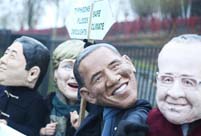A delegation of more than 100 high-profile Japanese business executives visited China from November 18 to November 24, hoping to mend trade ties between the two countries, which have been seriously damaged by the Japanese government's approach to and policy on the Diaoyu Island.
The delegation was led by Fujio Cho, Chairman of the Japan-China Economic Association and honorary Chairman of Toyota Motor Corporation. The association has sent a delegation to China every year since 1975, except in 2012 when it was canceled due to the Japanese government's move to "purchase" the Diaoyu Island.
Relations between China and Japan have been strained for more than 14 months since last September, when former Japanese Prime Minister Yoshihiko Noda's cabinet decided to "buy" part of the Diaoyu Islands despite strong Chinese opposition. In the same month, car sales in the Chinese market for Japan's three largest auto companies, Toyota, Nissan and Honda, saw a massive decline - by 49 percent, 35 percent and 41 percent respectively compared to the same period of the previous year. In the first ten months of this year, China's trade with the EU, the ASEAN and the U.S. all witnessed growth, while bilateral trade between China and Japan dropped by 7 percent year-on-year.
The delegation came to China shortly after the conclusion of the Third Plenum of the 18th Communist Party of China Central Committee. In the wake of this meeting China issued a reform blueprint which is commanding worldwide attention. Undoubtedly, Japanese enterprises also hope to benefit from "the Chinese opportunity".
Although the delegation is here in good faith, whether it can achieve its objectives does not depend on China.
China has always attached importance to Sino-Japanese relations, is committed to friendly bilateral cooperation, and promotes common development. When addressing problems and friction, China always adopts a positive attitude and takes the overall importance of bilateral ties into consideration.
In 2010, relations between China and Japan were disrupted due to a collision between a Chinese fishing boat and two Japanese patrol boats. But relations improved after Japan was hit by an 8.9-magnitude earthquake in March 2011, because of China's unselfish assistance to Japan.
However, the current chill has been caused by Japan's unilateral move. Sino-Japanese relations have been sustained on the basis of "cold politics and hot economy" over a period of time, but the incident concerning the "purchase" of the Diaoyu Island tells us that such relations are not normal. Japan cannot enjoy access to China's development while failing to show respect for bilateral ties.
Currently, on the Diaoyu Islands issue, the Japanese government is continuing to ignore China's position and deny the existence of any dispute. On historical issues, Japan seeks to detoxify its aggression and avoid its responsibilities; on its attitude towards China it plays up the "China threat" and tries to manipulate an "encirclement of China".
The Japanese government's attitude and approach can only make the prospects of restoring warm economic and trade relations more remote. A transient "hot economy" will not help the sustainability of "cold politics". To match efforts on the part of its civilians, the Japanese government also needs to reflect on its actions.
Only by eliminating this obstacle will Sino-Japanese relations enjoy sound development.
The author is Su Xiaohui, Deputy Director of International and Strategic Studies from the China Institute of International Studies.
 Finland has more eggs in the Chinese basket than any other
Finland has more eggs in the Chinese basket than any other In pictures: PLA's digital equipment
In pictures: PLA's digital equipment  Protesters demonstrate during UN Climate Change Conference in Poland
Protesters demonstrate during UN Climate Change Conference in Poland  Self-made farmer billionaire donates 69 villas at hometown
Self-made farmer billionaire donates 69 villas at hometown Demolition of bizarre rooftop villa in Beijing still in progress
Demolition of bizarre rooftop villa in Beijing still in progress Service seminar for E China train attendants
Service seminar for E China train attendants  Supermodel-turned-designer
Supermodel-turned-designer Cheerleaders light up CBA regular season
Cheerleaders light up CBA regular season  Finland--anytime you want is right time to go: Ambassador
Finland--anytime you want is right time to go: Ambassador Maritime counter-terrorism drill
Maritime counter-terrorism drill College students want partner for sex needs
College students want partner for sex needs Male belly dancer in women’s fitness club
Male belly dancer in women’s fitness club  15 best rivers for travelers in world
15 best rivers for travelers in world National Geographic Traveler Photo Contest
National Geographic Traveler Photo Contest Weekly Sports Photos
Weekly Sports PhotosDay|Week|Month